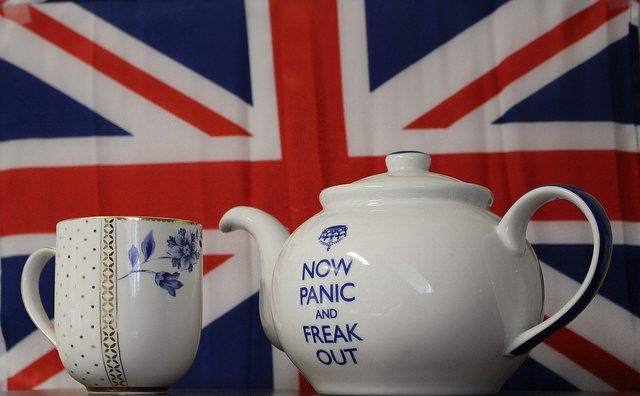Last week’s Brexit vote was sharply divided: 52 percent of U.K. residents voted to leave the European Union, while 48 percent voted to remain. It’s worth noting the demographic discrepancies. More young people voted to remain; older citizens voted to leave. More educated people voted to remain; those with lower levels of education voted to leave.
According to Vox, over the course of the past 20 years, the percentage of Britons ranking “immigration/race relations” as among the country’s most important issues has gone from near zero percent to about 45 percent. Seventy-seven percent of Brits today believe that immigration levels should be reduced. A May 2016 poll found that 52 percent of Britons believed Brexit would improve the U.K. immigration system, while only 21 percent said remaining would do the same.
The U.K. citizens who voted last week understood that voting to leave the E.U. would crush their economy. The pound has already dropped more than 8 percent. However, the winning “leave” side chose to prioritize: They believed the reduction of immigration was above all else. The vote was driven almost completely by racism and xenophobia.
According to the Washington Post, shortly after the Brexit vote was determined, west London saw a “racially motivated” attack against the Polish Social and Cultural Association when the organization’s building was defaced with graffiti reading “Go home.” Poles make up the largest foreign-born population in the U.K. In Cambridgeshire, leaflets were distributed with “Leave the E.U./No more Polish vermin,” written in both English and Polish.
The overseas racism may come as a shock to many Americans, especially here in overwhelmingly liberal Boston. However, it isn’t difficult to draw comparisons between the motivation behind the Brexit vote and racism and xenophobia in the U.S. One only has to look to the presumptive Republican nominee.
“I think there are great similarities between what happened here and my campaign. People want to take their country back,” Donald J. Trump said at a press conference in Scotland last week. Trump also applauded Scottish citizens for voting to leave the E.U., apparently unaware that the majority of Scots voted to remain.
Despite multiple claims that he is not racist, Trump has shown stark racism throughout his campaign. In late February, he refused to denounce the Ku Klux Klan, whose former grand wizard David Duke spoke out in favor of him. The Huffington Post provides a tidy list of other white supremacists who openly support Trump. Trump has notoriously characterized all Mexican immigrants as “criminals” and “rapists.” In November, he supported the physical assault of a Black Lives Matter protester at one of his rallies, and a few months later, he said that he would “look into” paying the legal fees of anyone who attacked protesters at his rallies. He has repeatedly stated that the U.S. should consider profiling Muslim Americans and barring the entry of Muslim immigrants into the country.
However, the most frightening part of Trump’s campaign is not Trump himself. It is the waters he stirs, the way that racism and xenophobia have become open and belligerent. Institutional and subversive racism are, of course, still issues that should be condemned and addressed, but the “charismatic” Trump seems to have brought open racism back into our everyday lives. Even in Boston, we see crimes like the assault of a homeless Latino man in Trump’s name – the perpetrators of which Trump later called “passionate.”
We at The Huntington News disavow the idea that racism and xenophobia should exist at all. We refuse to condone acts of hatred, both at home and overseas. The U.K. has just become a prime example of how a populist movement can win, setting a potentially dangerous precedent and showing us that Trump’s candidacy should not be taken lightly.
We encourage our readers not only to avoid engaging in racism and xenophobia, but to become actively involved in anti-racist efforts. Voting against Trump would be a good start.
Photo courtesy of frankieleon, Creative Commons















